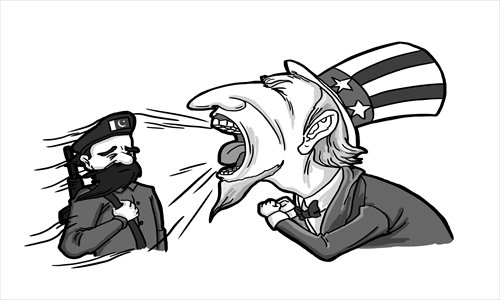US criticism only rubs salt in Pakistan's wounds

The US has blamed Pakistan for maintaining a close relationship with some Taliban forces, after Pakistani officials recently accused the US of doing too little on the border between Afghanistan and Pakistan.
But what country would want to get 40,000 of its civilians and 5,000 of its armed personnel killed and spend $68 billion while protecting terrorists? People in Pakistan have made huge sacrifices, and it is disheartening to learn that the country is still being blamed by the US for harboring terrorism.
The international forces seem to have failed in combating insurgents inside Afghanistan. The Afghan government has no writ beyond Kabul, and independent analysts have provided several reports indicating the strong presence of a Taliban shadow government all over Afghanistan save for the capital.
Pakistan cannot afford to have and does not have any relations with any branch of the Taliban. Pakistan desires peace and security more than the US or any other extra-regional power.
Several of our projects with Central Asian states are incomplete just because of the conflict in Afghanistan. And there can be no peace in Pakistan unless there is peace in Afghanistan.
Many Americans have complained bitterly about Pakistan harboring the Haqqani network. But the Haqqani network is an Afghan-based militant organization. If there was any evidence of the presence of the Haqqani network inside Pakistan, the country would act against them as well.
The chances are that Haqqani militants do cross the border from Afghanistan, but it is certain that they do not have a permanent base inside Pakistan.
In some people's eyes, Pakistan only pays attention to the Pakistani Taliban and has little interest in cracking down against the Afghan Taliban. Actually, the terrorists in Pakistan whom Pakistan can hunt are being crushed by the authorities here.
The Taliban who infiltrate from Afghanistan and are involved in terrorist activities inside Pakistan are targeted and killed whenever and wherever they're located. But they have to be stopped from the Afghan side. NATO forces need to build an effective mechanism to impede the cross border movement of the Afghan Taliban.
Whenever Pakistani armed forces engage the militants they escape to Afghanistan, and on the other side of the fence there is no force to stop them.
Then these fleeing militants conduct operations against the NATO and the US forces inside Afghanistan. And the US believes that these insurgents are aided by the Pakistani government.
But Pakistani forces cannot go after them inside Afghanistan, and it's the responsibility of Afghan forces and NATO to hunt them down.
There are several differences between Pakistan and the US on the issue of Afghanistan. Pakistan better understands Afghanistan, its society, the nature and dynamics of conflict, and possible solutions, because it is a neighbor. We have to live with the Afghans, while the US and other foreign troops can leave any time they want, as they are already doing.
A more devastated Afghanistan means more problems for Pakistan. These differences will not fade until the US is bold enough to recognize Pakistan's efforts and importance in solving the Afghan problem.
Relations are passing through a difficult phase, but both the US and Pakistan are working on to make things better. What the US needs to understand is that Pakistan wants relations on the basis of equality and mutual respect for each other's sovereignty.
Pakistanis respect Americans, but US government policies are giving rise to anti-Americanism inside our country. The misperceptions between the two can go away only when the US is willing to see Pakistan the way it is.
The article was compiled by Global Times reporter Shu Meng based on an interview with Aftab Hussein, assistant research officer at Islamabad Policy Research Institute in Islamabad. shumeng@globaltimes.com.cn
Militants pose corrosive threat across Afghan border